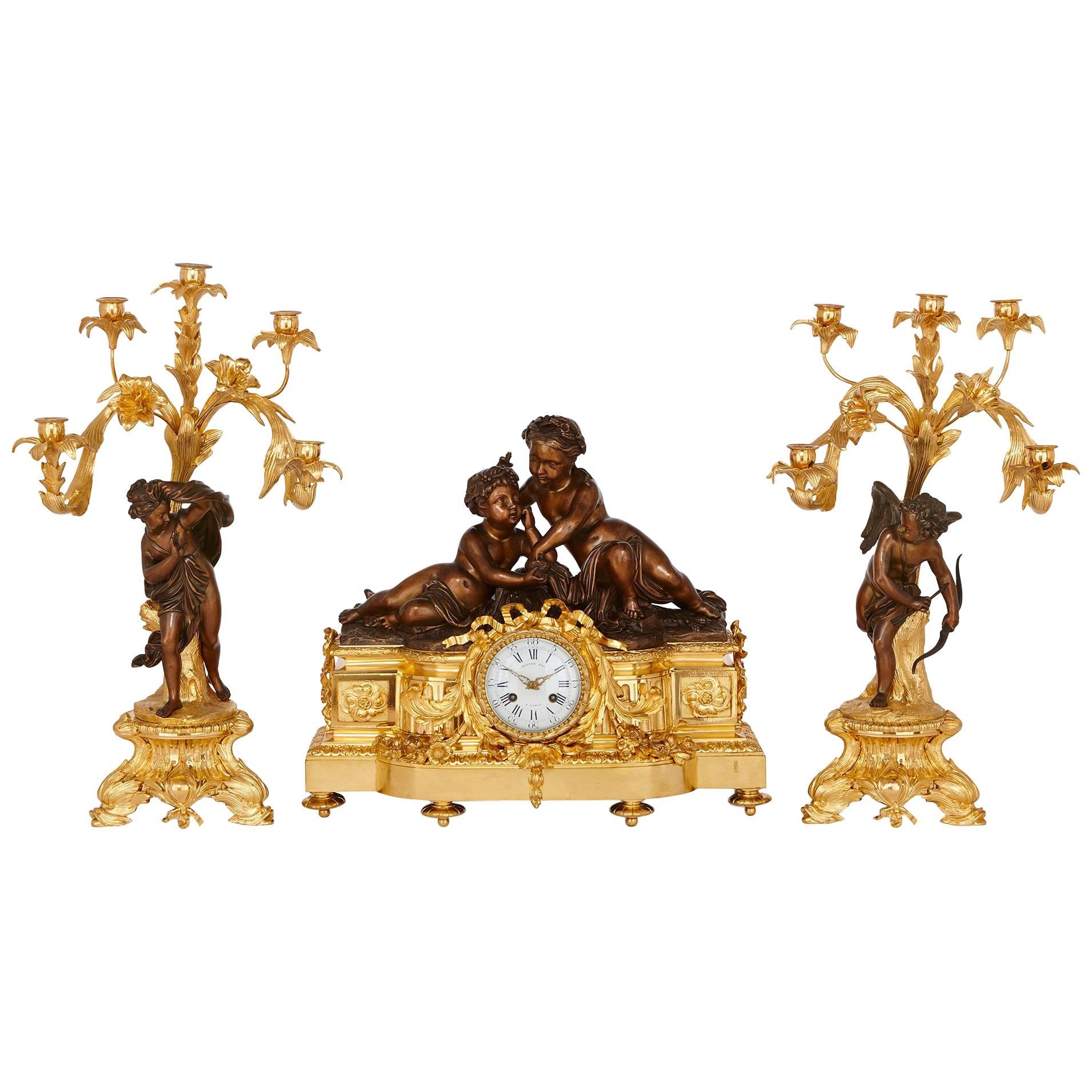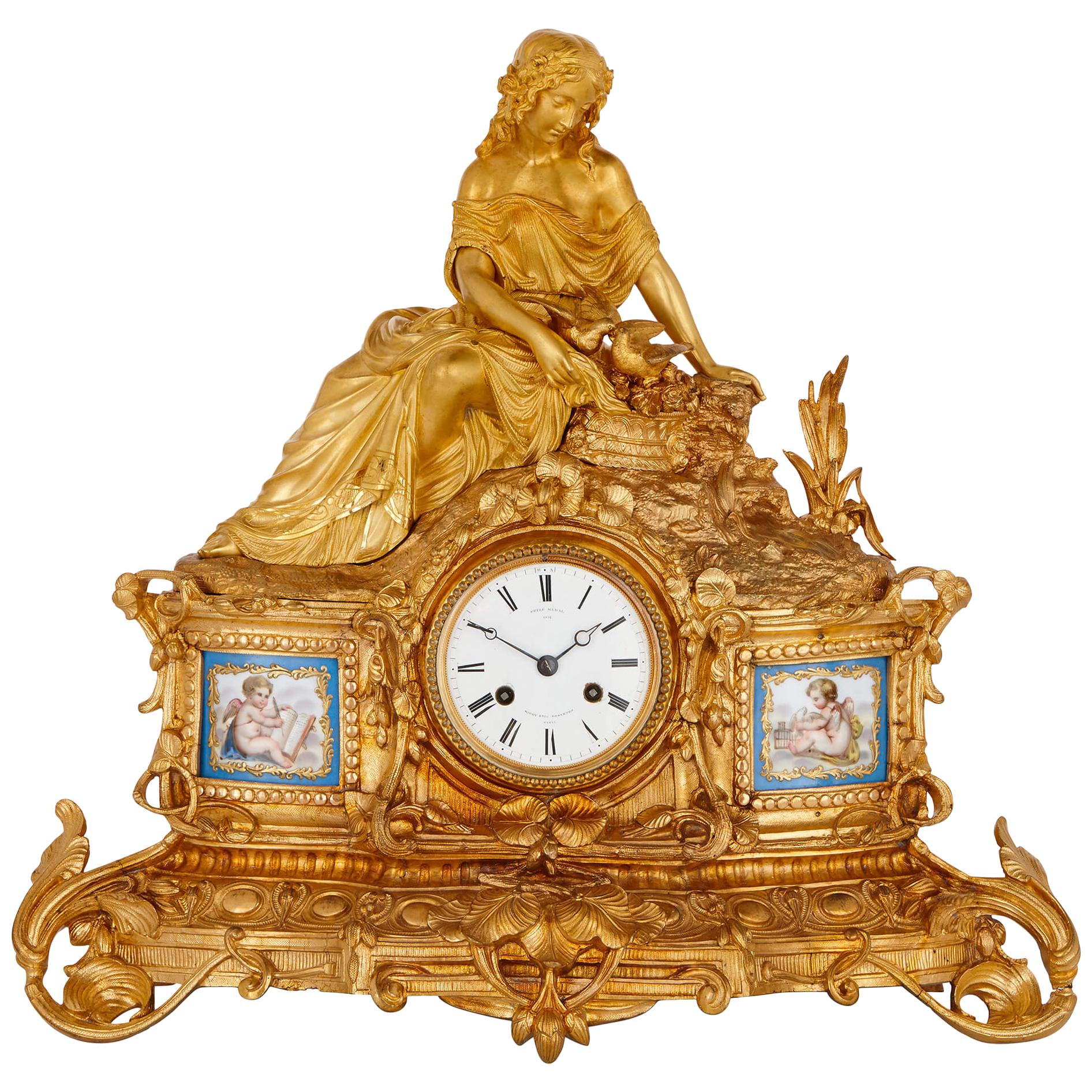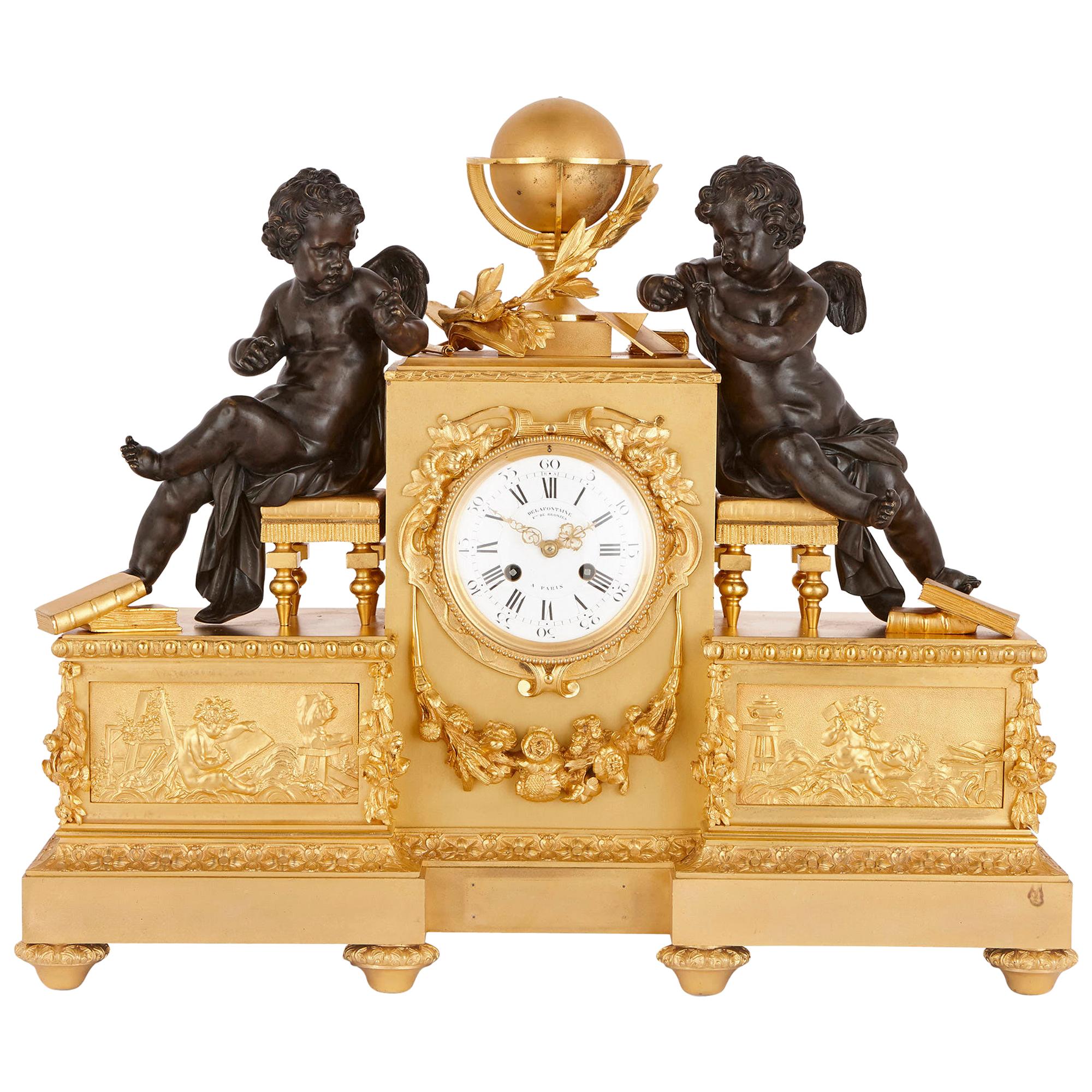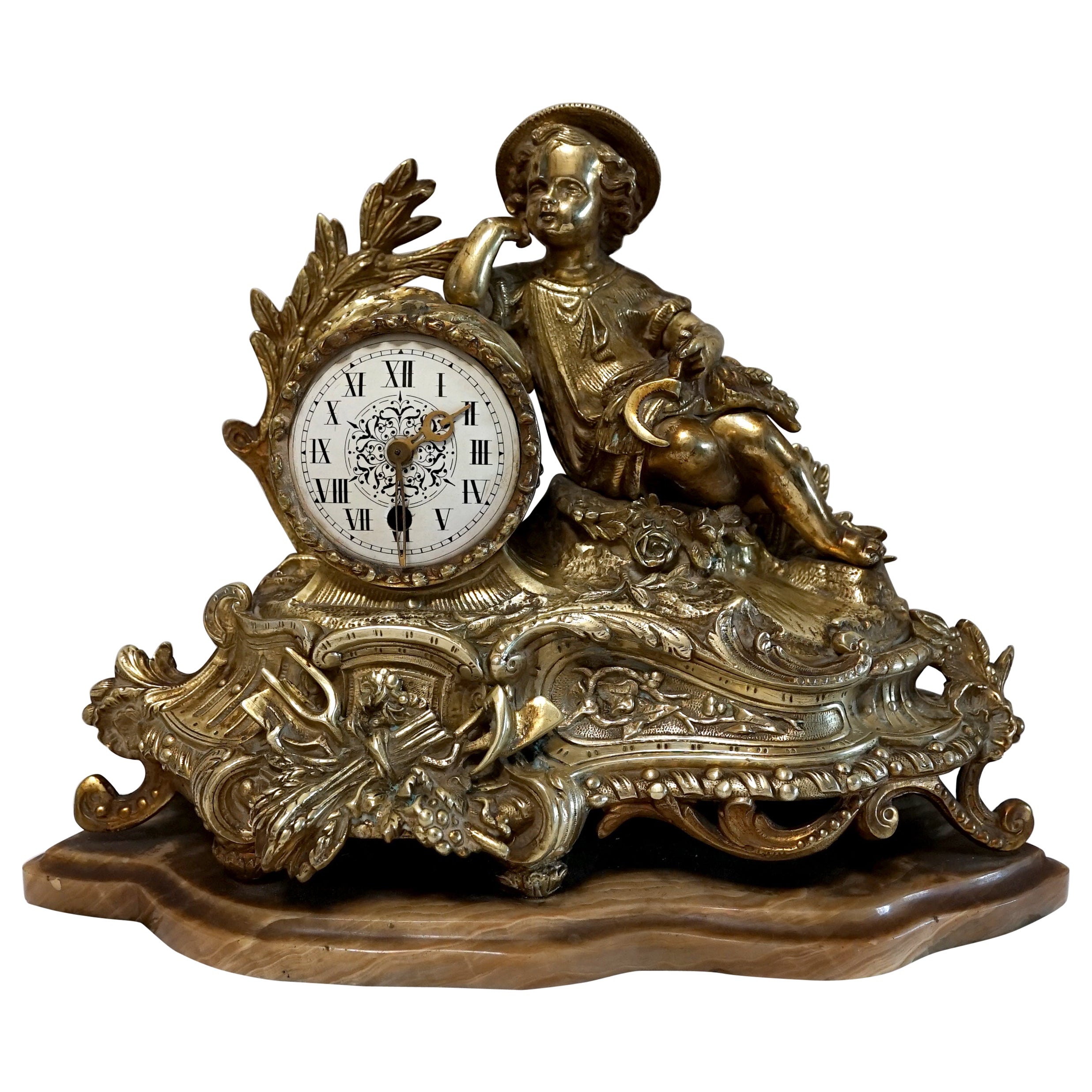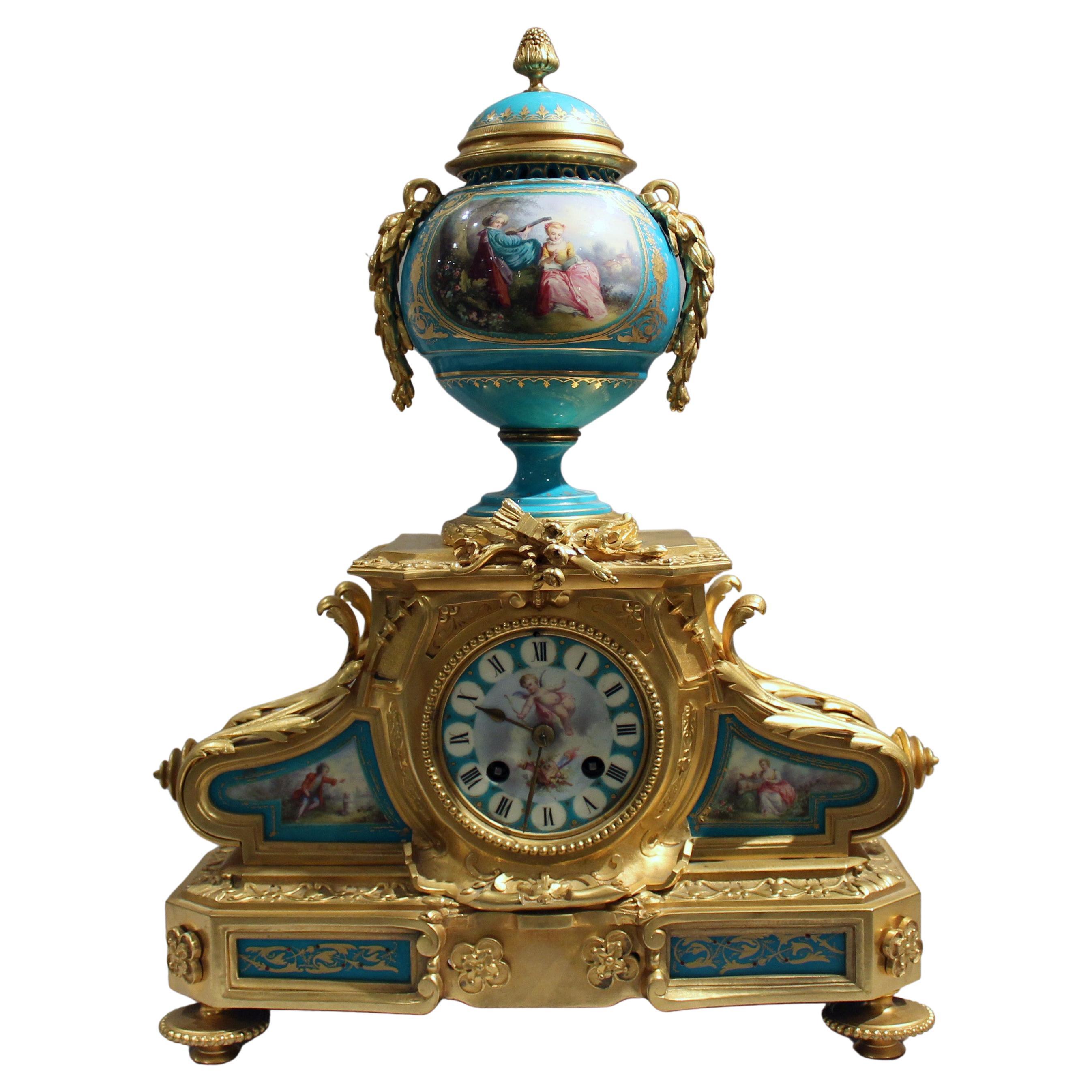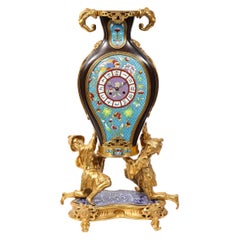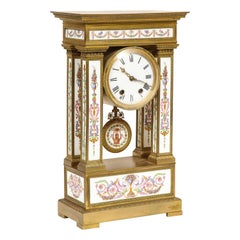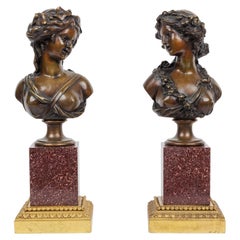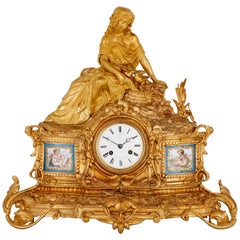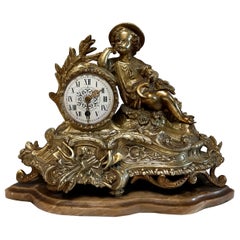Items Similar to Palatial & Rare Napoleon III French Ormolu and Patinated Bronze Clock, Detouche
Video Loading
Want more images or videos?
Request additional images or videos from the seller
1 of 22
Palatial & Rare Napoleon III French Ormolu and Patinated Bronze Clock, Detouche
About the Item
A Palatial and Extremely Rare Napoleon III French Ormolu and Patinated Bronze Regulateur de Parquet Clock by Louis-Constantin Detouche, Paris, Circa 1850
An exceptional testament to the grandeur and technical mastery of 19th-century French horology, this palatial and extraordinarily rare Napoleon III ormolu and patinated bronze Regulateur de Parquet clock stands as a crowning achievement of the renowned Parisian horologist Louis-Constantin Detouche. Created circa 1850, this monumental timepiece exemplifies the perfect synthesis of artistic opulence and mechanical precision, distinguishing itself as one of the most impressive works from Detouche’s illustrious oeuvre.
At over six feet tall, this clock’s imposing scale and decorative grandeur make it an object of immense historical and aesthetic significance. The case, crafted from the finest French ormolu, features two majestic patinated bronze seated putti, serving as allegorical figures and underscoring the artistic sophistication characteristic of the Second Empire style. The white enamel dial, elegantly signed "C. Detouche/Paris," affirms its prestigious maker, while the movement, meticulously numbered 7064 and bearing the stamps "C. Detouche RUE St. MARTIN" and "C. DETOUCHE 158 R. St MARTIN 160," speaks to the highest standards of 19th-century horological craftsmanship. Further distinguishing this piece is the medaille d’argent stamp, a testament to the numerous accolades and awards bestowed upon Detouche for his innovations in timekeeping.
A Masterpiece of Horological Artistry:
Louis-Constantin Detouche was not merely a clockmaker; he was a visionary whose contributions to horology redefined precision and complexity. This particular regulator clock is an extraordinary rarity within Detouche’s body of work. While the Maison Detouche produced numerous large-scale timepieces, few of this scale and decorative refinement exist outside of museum collections and historical institutions. Most of Detouche’s other known regulators incorporate significant astronomical or electrical complications, making this purely decorative and stately example a remarkable divergence from the norm.
Comparable examples further underscore its rarity and desirability. A similarly scaled astronomical regulator of approximately 185 cm in height, dating from 1855-1860, realized $218,625 at ArtCurial, Paris, in 2007, while another mahogany-cased electric regulator clock from the Paul Garnier collection fetched $86,909 at Christie’s London in 2004. Additionally, a monumental regulator clock, dating to 1863 and donated by Detouche to the Conservatoire Impérial des Arts et Métiers de Paris (Musée des Arts et Métiers, inv. 07179-0000), remains a historical artifact of similar prestige.
Detouche: A Legacy of Excellence:
The sheer grandeur of this clock aligns with critical historical descriptions of Detouche’s exhibition pieces. Notably, a contemporary critic at the Nîmes Exhibition of 1862 lauded Detouche’s craftsmanship, remarking upon the precision, ornamentation, and accessibility of his horological works. The critic highlighted the Maison Detouche’s receipt of prestigious awards, including the gold medal at the 1860 Exposition Universelle d’Horlogerie in Besançon and the gold medal at the London Exhibition of 1862. Furthermore, Detouche’s innovations earned him the Légion d’Honneur, a recognition of his profound impact on the field of horology.
Born in 1810, Louis-Constantin Detouche continued the legacy of his father, Georges Detouche, by expanding and refining the family business. Relocating to 158-160 Rue St. Martin in 1830, he later employed Jacques François Houdin as his chef d’atelier, whose technical ingenuity significantly enhanced the firm's reputation. The Maison Detouche’s acclaim was solidified through exhibitions at the Great Exhibition of 1851, the Exposition Universelle of 1855, and various international showcases that followed.
Among his most legendary achievements is the pair of astronomical regulators, one of which was prominently displayed at the intersection of Rue Saint-Martin and Rue de Rivoli before being transferred to the prestigious collection of François-Paul Journe SA Manufacture in Geneva. These masterpieces, featuring an astonishing fourteen subsidiary dials providing celestial and meteorological information, stand as testaments to Detouche’s unparalleled craftsmanship.
Conclusion
This palatial ormolu and patinated bronze Regulateur de Parquet by Louis-Constantin Detouche is more than a timepiece—it is a sculptural marvel and a historical artifact of immeasurable value. As one of the grandest and rarest works from Detouche’s repertoire, it represents the pinnacle of Napoleon III-era horology. Its blend of masterful design, technical excellence, and monumental scale ensures its place among the most significant 19th-century French clocks, making it an unparalleled acquisition for the most discerning collectors, institutions, and connoisseurs of fine horology.
Provenance:
Exhibited at the Great London Exhibition 1851
Exhibited by Detouche at the Exposition de Nimes, 1862, where Detouche won a gold medal, the clock remarked by the jury as “un régulateur genre rocaille en bronze doré, d'un gout remarquable et d'une hauteur de 1m 90”.
By repute, formerly in the collection of the Florsheim family, Chicago
Private North American collection, acquired privately early 2000s
Solomon Treasure New York, where acquired from above.
Literature:
Revue Chronométrique, vol. IV, Paris, 1862, "Exposition de Nîmes - Rapport du Jury” pp. 605-609.
Tardy, Dictionnaire des horlogers français, Paris, 1971-1972, pp. 182-183.
Measures: 81" high x 50" wide x 19" deep
Excellent condition. No damages noted.
The glass panels on the front and back of the lower sections have been replaced by Perspex.
- Creator:C. Detouche (Clockmaker)
- Dimensions:Height: 81 in (205.74 cm)Width: 50 in (127 cm)Depth: 19 in (48.26 cm)
- Style:Napoleon III (Of the Period)
- Materials and Techniques:
- Place of Origin:
- Period:
- Date of Manufacture:circa 1850
- Condition:Wear consistent with age and use.
- Seller Location:New York, NY
- Reference Number:1stDibs: LU1798215584552
About the Seller
5.0
Gold Seller
Premium sellers maintaining a 4.3+ rating and 24-hour response times
Established in 1980
1stDibs seller since 2016
63 sales on 1stDibs
Typical response time: <1 hour
- ShippingRetrieving quote...Shipping from: New York, NY
- Return Policy
Authenticity Guarantee
In the unlikely event there’s an issue with an item’s authenticity, contact us within 1 year for a full refund. DetailsMoney-Back Guarantee
If your item is not as described, is damaged in transit, or does not arrive, contact us within 7 days for a full refund. Details24-Hour Cancellation
You have a 24-hour grace period in which to reconsider your purchase, with no questions asked.Vetted Professional Sellers
Our world-class sellers must adhere to strict standards for service and quality, maintaining the integrity of our listings.Price-Match Guarantee
If you find that a seller listed the same item for a lower price elsewhere, we’ll match it.Trusted Global Delivery
Our best-in-class carrier network provides specialized shipping options worldwide, including custom delivery.More From This Seller
View AllFrench Japonisme Ormolu, Patinated Bronze, and Cloisonne Enamel Mantel Clock
By Edouard Lievre, L'Escalier de Cristal
Located in New York, NY
A French Japonisme Chinoiserie Ormolu, patinated bronze, and cloisonne enamel mantel clock, Attributed to Escalier De Cristal and Edouard...
Category
Antique Late 19th Century French Japonisme Mantel Clocks
Materials
Bronze, Enamel
A Rare and Exquisite French Ormolu and Porcelain Clock, attributed to Deniere
By Maison Deniere
Located in New York, NY
A Rare and Exquisite French Ormolu Bronze and Porcelain Clock, attributed to Jean Francois Deniere,
circa 1810.
This large and elaborate clock is made of the finest quality ormolu and porcelain during the period. Of rectangular form, with porcelain and bronze columns painted with flowers and griffins, this clock would make a statement in any room.
To a clock collector, this clock is a true masterpiece! Similar clocks like this, by Deniere, are in prestigious museums and collections worldwide, including the Frick Collection and the Royal Collection Trust.
21.5" high x 12" wide x 6" deep
**For a similar clock see Christies New York, 21 November 2008, Lot # 139, sold for $50,000.
Very good condition with no damages. All original parts. Clock is not running.
More photos available upon request.
Jean-François Deninger, called Denière, was one of the most illustrious bronziers of the first half of the 19th century. Appointed Envoy in Constantinople around 1796, the bronzier Denière entered into partnership with François Mathelin in 1797. They founded a prosperous operation and their atelier had over 200 workers during the Empire period - a number that subsequently doubled during the reign of Louis-Philippe. Fournisseur to the duchesse de Berry and Louis-Philippe, Denière also worked for the duke of Hamilton, Ferdinand VII of Spain, William II of Hesse, William II of Holland, Tsar Alexander II of Russia, and other heads of state. In 1817-1818 Denière furnished some of the bronze work for the redecoration of the White House in Washington. He furthermore produced the mounts for the cradle of the duc de Bordeaux in 1820 and the bronzes for Charles X's coronation coach...
Category
Antique Early 19th Century French Mantel Clocks
Materials
Bronze, Ormolu
A Monumental and Exceptional French Ormolu and Turquoise Sevres Porcelain Clock
Located in New York, NY
A Monumental and Exceptional French Ormolu and Turquoise Sevres Porcelain Clock, circa 1875
Immerse yourself in the splendor of 19th-century French artistry with this monumental and...
Category
Antique 19th Century French Napoleon III Mantel Clocks
Materials
Ormolu
Pair of French Ormolu and Patinated Bronze Figural Busts on Porphyry Bases
Located in New York, NY
A Pair of French Ormolu and Patinated Bronze Figural Busts on Porphyry Bases, circa 1875.
One bust signed Marin, the other L.V.E Robert - a truly magnificent pair of busts...
Category
Antique 19th Century French Napoleon III Figurative Sculptures
Materials
Porphyry, Bronze, Ormolu
Exceptional French Ormolu-Mounted Turquoise Jeweled Sevres Porcelain Clock Set
By Raingo Frères
Located in New York, NY
An exceptional French bronze ormolu mounted turquoise jeweled Sèvres Porcelain clock set by Raingo Fres, Paris, circa 1880.
Comprising of...
Category
Antique Late 19th Century French Napoleon III Mantel Clocks
Materials
Bronze, Ormolu
$33,000 Sale Price
40% Off
Exquisite French Empire Ormolu and Cut-Crystal Clock, c. 1815
Located in New York, NY
An exquisite French Empire ormolu and cut-crystal clock, c. 1815, attributed to Baccarat.
Made from the finest quality mercury gilding ormolu, this c...
Category
Antique Early 19th Century French Empire Mantel Clocks
Materials
Crystal, Ormolu
$21,000 Sale Price
40% Off
You May Also Like
Napoleon III Period Ormolu and Patinated Bronze Clock Set by Picard
By Henri Picard
Located in London, GB
This magnificent clock set is the work of celebrated French maker Henri Picard, who collaborated on this fine piece together with the famous firm of clockmakers, Raingo Freres. Both ...
Category
Antique 19th Century French Neoclassical Mantel Clocks
Materials
Ormolu, Bronze
Napoleon III Period Gilt Bronze and Sèvres Style Porcelain Mantel Clock
By Miroy Frères
Located in London, GB
This sophisticated gilt bronze mantel clock is an elegant piece of mid-19th century design, beautifully cast and gilded and set with two delicate Sèvres style porcelain panels. The clock case's finest feature is the charmingly naturalistic scene at its top, showing a full-length sculpture of a female figure sitting with a basket and two doves. They are displayed on a naturalistic, oval-shaped plinth, which is decorated all around its exterior with painstakingly intricate foliate motifs.
Either side of the plinth there are two Sevres style porcelain panels, each of which shows a winged putto. One putto is shown writing, while the other is shown holding a dove. Each is set inside a turquoise blue border decorated with delicate gilt scrolls. In the centre of the plinth sits the clock dial, which is enamelled and contains Roman numerals. It is signed 'Prize Medal 1851 / Miroy Fres Brevetes / Paris' after the clock's maker, Miroy Freres...
Category
Antique 19th Century French Napoleon III Mantel Clocks
Materials
Ormolu, Bronze
Napoleon III Period Gilt and Patinated Bronze Clock by Delafontaine
Located in London, GB
The acclaimed French bronze foundry, Delafontaine, created this remarkable mantel clock. At the time this piece was crafted, in c.1860, the company was directed by Auguste-Maximilien Delafontaine (1813-1892). The firm was famous for its high-quality artistic bronzes, which can today be viewed in major art collections, such as the Louvre in Paris.
Shaped like an upside down ‘T’, this gilt bronze...
Category
Antique 1860s French Napoleon III Mantel Clocks
Materials
Bronze, Enamel, Ormolu
Napoleon III Gilt Ormolu Mantel Clock
Located in Lomita, CA
This is a wonderful Napoleon III ormolu mantle clock from the estate of a Los Angeles collector from around 1860. There is a zaftig little boy perched at the top of the clock, and f...
Category
Antique Mid-19th Century French Napoleon III Mantel Clocks
Materials
Brass
$1,276 Sale Price
20% Off
Napoleon III Patinated Bronze & Ormolu Crown, France, Circa 1870
Located in West Palm Beach, FL
Napoleon III Patinated Bronze & Ormolu Crown, France, Circa 1870
A rare and unusual Napoleon III patinated bronze and ormolu crown from France, circa 1870. This distinctive work fea...
Category
Antique 19th Century French Napoleon III Figurative Sculptures
Materials
Bronze, Ormolu
$2,360 Sale Price
20% Off
French Napoleon III blue porcelain and ormolu clock
Located in London, GB
A very fine & attractive French porcelain & gilt bronze mantle clock. A superb dial & very finely painted urn surmounting the clock. To each side of the dial further painted panels. ...
Category
Antique 1880s French Mantel Clocks
Materials
Bronze
Recently Viewed
View AllMore Ways To Browse
Napoleon Bronze France
Rare Artifact
French Artifacts
Empire Bronze Napoleon
Antique Clock Stand
Napoleon Iii Enamel
Rare French Clocks
Napoleon Bronze Glass
Napoleon Medalion
Gold Ormolu Stand
Early American Clocks
Rual Georges
American Masterpiece Collection
Precision Clock
Medaille Bronze
French Chefs
American Case Clocks
Imperial Glass Works
